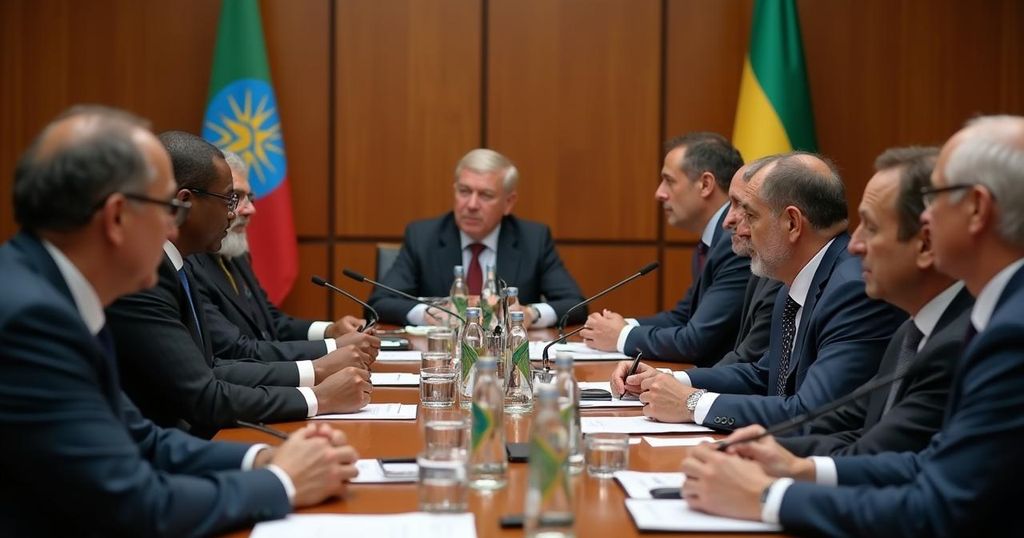Eritrea hosted a trilateral summit with Ethiopia’s regional adversaries, focusing on collaborative strategies against perceived Ethiopian interference. Tensions have escalated especially following Ethiopia’s agreement with Somaliland. Egypt has taken advantage of this rift to strengthen its position against Ethiopia regarding the Grand Ethiopian Renaissance Dam, while Eritrea warns of a returning conflict with Ethiopia. Analysts indicate a diplomatic posture rather than an imminent military confrontation is likely, despite the precarious regional dynamics.
On October 10, Eritrea’s long-time leader, Isaias Afwerki, convened a significant trilateral meeting in Asmara with Somali President Hassan Sheikh Mohamud and Egyptian President Abdel Fattah el-Sisi. The leaders addressed strategies to address “interference in the internal affairs of the countries of the region under any pretext or justification,” according to their joint statement post-summit. They also committed to enhancing collaboration to strengthen Somali institutions aimed at combating terrorism and safeguarding national borders. This summit follows escalating tensions involving Ethiopia, Somalia, and Eritrea. Particularly, relations between Ethiopia and Somalia have deteriorated sharply since January, when Ethiopia formalized a memorandum of understanding with Somaliland, a separatist region that Somalia claims as its own, leading to increased hostilities. In retaliation, Somalia has vowed to expel Ethiopian troops by the end of the year unless the understanding is revoked. Furthermore, Egypt has utilized the friction stemming from this situation to apply pressure on Ethiopia regarding the contentious Grand Ethiopian Renaissance Dam (GERD) project. Following a military cooperation agreement with Somalia in August, Egypt has supplied arms to Mogadishu and is considering the deployment of troops as a substitute for the Ethiopian forces combating Al-Shabaab. Eritrea, having previously aligned with the Ethiopian government during the civil war in Tigray, is now at an impasse with Addis Ababa, particularly after opposing the peace agreement with the Tigray People’s Liberation Front (TPLF) in November 2022. Isaias Afwerki remains wary of Ethiopia’s ambitions concerning Eritrea’s ports, from which it lost access upon Eritrea’s independence in 1993. Despite these tensions, analysts suggest that a full-scale military confrontation remains unlikely due to Somalia’s military weakness and Egypt’s current economic issues coupled with the Middle Eastern conflict. Eritrea itself is still recovering from its own conflicts, while Ethiopia contends with internal insurgencies. Observers argue that current posturing is more diplomatic in nature than indicative of imminent warfare; however, the historical reconciliation between Ethiopia and Eritrea is reverting to a precarious state of “no war, no peace.” Thus, while the immediate atmosphere appears tense, the likelihood of direct military engagement remains low, albeit recently observed trends point to a potential deterioration in regional stability.
The geopolitical landscape of the Horn of Africa has become increasingly complex, primarily influenced by historical grievances and territorial disputes among Eritrea, Ethiopia, and Somalia. This region has seen fluctuating alliances and hostilities shaped by colonial legacies, territorial claims, and developmental initiatives like the Grand Ethiopian Renaissance Dam (GERD), which complicates relations with Egypt over water access. Furthermore, the civil war in Tigray exacerbated tensions not just between Ethiopia and the TPLF but also created rifts with Eritrea, revealing deeper national anxieties about sovereignty and military security. The trilateral meeting signifies not only a strategic alliance but also a shared apprehension towards Ethiopia’s actions in the region, indicating a potential reconfiguration of power dynamics.
The recent trilateral summit between Eritrea, Somalia, and Egypt marks a pivotal moment in the Horn of Africa, as these countries seek to consolidate their positions against perceived aggressions from Ethiopia. While immediate military action seems improbable due to each nation’s internal challenges, the rising rhetoric and strategic alliances suggest a concerning shift towards confrontation. Thus, the fragile peace established in 2018 appears increasingly threatened, ushering in a renewed state of regional instability.
Original Source: www.theafricareport.com






